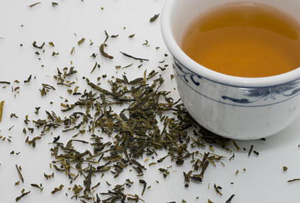
The study compared the effect of various beverage additives on catechins, naturally occurring antioxidants found in tea. Results suggest that complementing green tea with either citrus juices or vitamin C likely increases the amount of catechins available for the body to absorb.
“Although these results are preliminary, I think it’s encouraging that a big part of the puzzle comes down to simple chemistry,” said Mario Ferruzzi, assistant professor of food science at Purdue University and the study’s lead author.
Catechins (pronounced KA’-teh-kins), display health-promoting qualities and may be responsible for some of green tea’s reported health benefits, like reduced risk of cancer, heart attack and stroke. The problem, Ferruzzi said, is that catechins are relatively unstable in non-acidic environments, such as the intestines, and less than 20 percent of the total remains after digestion.
“Off the bat you are eliminating a large majority of the catechins from plain green tea,” Ferruzzi said. “We have to address this fact if we want to improve bodily absorption.”
Ferruzzi tested juices, creamers and other additives that are either commonly added to fresh-brewed tea or used to make ready-to-drink tea products by putting them through a model simulating gastric and small-intestinal digestion. Citrus juice increased recovered catechin levels by more than five times, the study found. Ascorbic acid, or vitamin C, used to increase shelf life in ready-to-drink products, increased recovered levels of the two most abundant catechins by sixfold and 13-fold, respectively.
The study, published this month in Molecular Nutrition and Food Research, also found that soy, dairy and rice milk appeared to have moderate stabilizing effects. But Ferruzzi said the result is misleading; a chemical interaction between milk proteins and tea catechins apparently helps shelter the complex from degradation, a force likely overcome by enzymes within a healthy human digestive system.
Lemons and tea go even better together than their popularity might suggest. Lemon juice caused 80 percent of tea’s catechins to remain, the study found.
